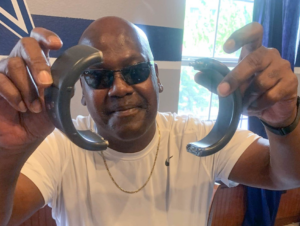Justice Long Overdue: Mississippi District Attorney Drops All Charges Against Curtis Flowers

Photo courtesy of American Public Media
Today, our blog post discusses the upsetting and complicated case of Curtis Flowers, the man popularly featured in American Public Media’s “In the Dark” podcast. Flowers was initially charged with murder in connection with a 1996 shooting of four furniture store employees in Mississippi. Over the next 15 years, Mississippi District Attorney (“DA”) Doug Evans prosecuted Flowers six separate times for this same crime before the case was eventually sent to the U.S. Supreme Court. This post provides an overview of Flowers’s long-lasting battle with the Mississippi criminal justice system, and also analyzes how and why it took over 20 years for Flowers to be rightfully released.
Mississippi District Attorney Tries Flowers Six Times for Same Crime
Curtis Flowers’s story begins at Tardy Furniture, a former furniture store located in Winona, Mississippi. Flower’s actually worked at Tardy Furniture for a short amount of time but was fired two weeks before the shooting. On the day of the shooting – July 16, 1996 – a retired employee of Tardy Furniture entered the store to find that all employees inside the building had been fatally shot. The victims were owner Bertha Tardy and three employees: Robert Golden, Carmen Rigby, and Derrick Stewart. The picture below depicts Tardy Furniture on the day of the shooting.
In January 1997, Flowers was arrested for the murder of these four individuals. The prosecution’s case was primarily based on a few key pieces of circumstantial evidence, including:
- Flowers’s firing from Tardy Furniture and the fact that he still owed owner Bertha Tardy $30;
- Flowers’s walking route on the morning of the shooting;
- the gun allegedly used in the murders; and
- the alleged confessions made by Flowers to people in prison.
Despite the fact that the DA did not have any direct evidence of Flowers’s involvement in the shooting, the State nonetheless proceeded with the first trial in 1997 and sought the death penalty.

Photo courtesy of American Public Media’s Investigative File
Between 1997 and 2010, Mississippi DA Doug Evans prosecuted Flowers six separate times for the murders committed in Tardy Furniture. The first two trials ended in convictions, but both were soon overturned by the Mississippi Supreme Court for prosecutorial misconduct. Namely, the state’s high court determined that Evans introduced prejudicial evidence against Flowers and also asked questions without the appropriate degrees of “good faith” and “basis in fact” required by the rules of evidence.
On his third try, DA Evans earned a conviction and sentence of death at the trial court level, but once again had this verdict reversed – this time based on Evans’s discriminatory practices during the jury selection process. Specifically, Evans selected a jury comprised of 11 white jurors and only one black juror in a county that is nearly 50% African American. After being forced to approach jury selection with more racial fairness, Evans continued attempting to convict Flowers, but the next two trials both ended in hung juries (i.e., the jury was split and could not reach a unanimous verdict). Finally, in 2010, Flowers was tried for the sixth time by DA Evans with respect to the same Tardy Furniture murders from 1996. This time, the jury – which was again comprised of 11 white jurors and only one black juror – convicted Flowers and sentenced him to death.
U.S. Supreme Court Frees Flowers from Prison
Given the racial inequity of the jury in Flowers’s sixth trial, his attorneys appealed the conviction to the U.S. Supreme Court. The Supreme Court listened to arguments on the case in March 2019, and on June 21, 2019, Justice Brett Kavanaugh wrote the Court’s opinion reversing Flowers’s sixth conviction. The Court ruled 7-2 in Flowers’s favor primarily holding that DA Evans’ peremptory strikes (i.e., an attorney’s ability to challenge a prospective juror’s assignment to the jury without citing a specific reason) of black jurors were at least partially motivated by discriminatory intent.
In coming to this conclusion, the Supreme Court focused on several aspects of the State’s prosecution of Flowers. Namely, the Court pointed out that DA Evans heavily questioned prospective black jurors while failing to pose as many questions to white jurors. The Court also noticed a disturbing pattern of discriminatory jury selection practices occurring throughout almost all of Flowers’s trials, and even labeled the State as “relentless” in trying to exclude all black jurors. Justices Thomas and Gorsuch dissented from the majority’s opinion, arguing that the majority overlooked the prosecution’s defenses for its conduct and that the Court should not have granted review of Flowers’s case in the first place.
Despite the Supreme Court’s ruling in Flowers’s favor (in addition to the prosecution’s key witness recanting his statement that Flowers admitted to committing the murder in prison), there were still concerns that Mississippi would bring charges against Flowers for the seventh time. However, on December 16, 2019, Curtis Flowers was released on bail, allowing him to be free for the first time in 23 years. Shortly thereafter, DA Doug Evans recused himself from the case in January 2020. Following several months of investigation by the Mississippi DA’s office, prosecutors announced in a motion to dismiss that they would be dropping all charges against Curtis Flowers. The Circuit Court of Montgomery Country promptly granted this motion, officially making Flowers a free man on September 4, 2020.
Key Takeaways
In terms of the takeaways from Curtis Flowers’s situation, there are surely many observers who have rightfully asked: How could Flowers face prosecution six different times for the same crime? Was he not protected by the concept of double jeopardy?
Initially, it is true that the Fifth Amendment protects criminal defendants from being prosecuted more than once for the same crime. However, Flowers did not receive this protection because he was never acquitted (i.e., declared not guilty) during any of his six trials. As mentioned above, the first three convictions were overturned on procedural issues, the next two ended in mistrials, and the sixth was appealed to the U.S. Supreme Court. Nevertheless, in similar situations, American Public Media’s (“APM”) research on this issue revealed that virtually all active prosecutors would choose not to pursue the same case more than two or three times. In fact, APM could only find one other recent scenario mirroring Flowers’s case, and that was another man in Mississippi named Marcus Roberson who was tried eight separate times for murder charges before eventually pleading guilty. In light of the broad discretion given to prosecutors in this situation, though, DA Doug Evans was able to continue prosecuting Flowers as many times as he saw fit.
Furthermore, it is important to highlight the serious issues within our criminal justice system that were exposed through the decades-long failed prosecution of Curtis Flowers. First of all, the discussion above reveals how damaging broad prosecutorial discretion can be under many circumstances. In the case of Curtis Flowers, despite DA Evans’s continued prosecutorial misconduct and clear racial bias in jury selection, he was able to keep dragging Flowers into the courtroom simply because the law permitted him to do so.
Along these same lines, Flowers’s case also shows how difficult it can be to challenge a wrongful conviction in the face of an aggressive prosecutor, even when that prosecutor only possesses circumstantial evidence. And unfortunately, a final point coming from this case relates to racial prejudice in the criminal justice system. While our society and court system have certainly made strides with respect to racial equality, this modern case demonstrates that racially motivated prosecutions are still alive and well. Studies have shown that people of color are disproportionately sentenced to death in the United States, especially where the victim was white. A University of Michigan study also concluded that, “African Americans are only 13% of the American population but a majority of innocent defendants wrongfully convicted of crimes and later exonerated.” Therefore, while we can celebrate Curtis Flowers finally being freed, his case should also serve as a reminder that we have a long way to go to achieve racial equality in our criminal justice system.
About Coffman Law Offices, P.C.
Coffman Law is Chicago’s leading personal injury law firm and is committed to providing superb legal representation for people who are suffering from severe personal injuries or are dealing with the loss of a loved one due to negligence or misconduct. Coffman Law is a results-driven law firm focused on ensuring that clients receive the compassion, attention, and consideration that they need to seek adequate compensation for injuries or loss. The firm is led by Owner and Founding Partner Brian Coffman, who has dedicated his career to helping accident victims navigate the legal system and obtain compensation for their injuries. If you have been injured or lost a loved one, contact Coffman Law today for a free consultation.




